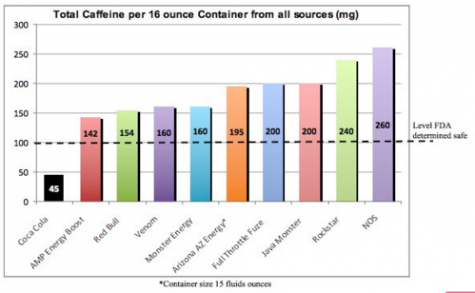Energy Drinks – Life Saver or Killer?
It’s summative week. You feel overwhelmed, with every class simultaneously flinging assessments at you. What’s the best solution? According to us, it’s trading sleep for studying. To get through the next school day, it seems as if the only solution is to load up on caffeine. And we all know the best way to do that is a good energy drink – be it Red Bull, Monster Energy, or whatever strikes your fancy.
Many Graded students rely on a caffeine rush to get through the day, with the consumption frequency generally rising in proportion with their grade level. However, it may surprise you to know that, in England, the government has recently proposed a ban on energy drinks for children under 18. The reason for this measure is that caffeine has many health risks for the general population, especially teenagers. A large enough dose of it can cause insomnia, nervousness, restlessness, anxiety, stomach irritation, nausea, vomiting, increased heart rate, and hyperactivity. Therefore, the English government has proposed the implementation of a ban – for people under the age of 18 – on drinks containing 150mg of caffeine or more per liter. They hope it will help promote awareness of the dangers of the substance’s overconsumption (not to mention their struggle in decreasing childhood obesity). As Public Health Minister Steve Brine said:
“We all have a responsibility to protect children from products that are damaging to their health and education, and we know that drinks packed to the brim with caffeine, and often sugar, are becoming a common fixture of their diet. Our children already consume 50% more of these drinks than our European counterparts, and teachers have made worrying links between energy drinks and poor behavior in the classroom.”
Energy drinks typically contain between 48-300 mg of caffeine per serving. For an adolescent, the healthy amount is below 100 mg. Consuming between 100-400 mg of caffeine can cause many adverse effects on children and teenagers, even though it is widely considered to be a moderate dose for adults.
Concerns about caffeine consumption extend beyond the United Kingdom to other nations – including Brazil. There are various articles that highlight the ongoing debate regarding the safety of energy drinks for minors in Brazil. A piece written by Natasha Romanzoti stresses the importance of the speed in which children and teens can metabolize caffeine. According to her, younger children digest the substance slower than adults, meaning that it stays in their body for longer, causing more damage. With that, caffeine consumption during teenage years can truly affect an adult’s future rate of metabolism.
In moderate doses, however, caffeine is quite beneficial. A cup of coffee every once in a while can decrease the risk of type 2 diabetes, Parkinson’s, and liver cancer, as well as lower the risk of heart failure by as much as 11%. In fact, one cup of coffee contains between 40 mg and 90 mg of caffeine, which falls within the healthy range of the stimulant. Given its benefits, the English government decided to maintain the drinks that provide a healthy amount of the substance while banning those that contain an excessive amount of caffeine.
Many Graded students can get through the IB’s workload with no chemical help whatsoever. However, those that do depend on it should reflect on how it can affect their physical health. If you happen to be one of these students, consider the fact that, although caffeine can enhance focus and energy, a large enough dose can hinder your performance at school and later on in life.
Sources: BBC, WebMD, Medical News Today, Lusíadas, HypeScience

2018: the year in which one Senior girl decides to defeat her apathy and finally join The Talon. Follow Juliana as she struggles through her last year...











